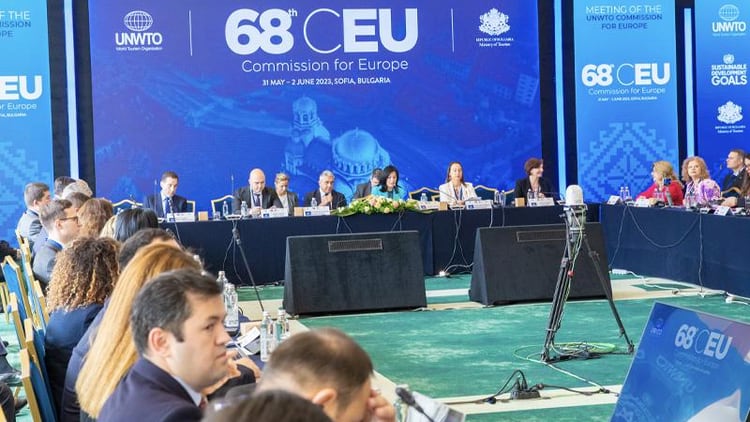The Diplomat
European tourism leaders have met to advance shared plans for the sector’s future. The 68th meeting of the UNWTO Regional Commission for Europe (31 May – 2 June, Sofia, Bulgaria), assessed the current state of tourism in the region while also recognizing the vital importance of education, jobs and investments for a more inclusive and sustainable future.
Ahead of the meeting, UNWTO Secretary-General Zurab Pololikashvili met with President Rumen Radev and the Prime Minister of Bulgaria Galab Donev, accompanied by Minister of Tourism of Bulgaria Ilin Dimitrov, to discuss shared priorities and areas of cooperation.
- Prime Minister Donev welcomed the latest UNWTO data which shows Bulgaria is among the fastest recovering of European destinations, with international arrivals in the first quarter of year 27% higher than in 2019.
- In recognition of their leadership, President Radev awarded UNWTO Secretary-General Pololikashvili and the Director for Europe Alessandra Priante with the Order of Saints Cyril and Methodius, 1st Class and 2nd Class respectively, at a special ceremony in the Coat of Arms Hall.
- The two parties jointly recognized tourism’s importance for driving economic development and strengthening peace and understanding.
- The UNWTO delegation welcomed the Bulgarian Government’s work to diversify its tourism sector, with a focus on growing new areas including wellness, health and gastronomy tourism and supporting rural communities.
UNWTO Secretary-General Zurab Pololikashvili said: “European tourism is recovering strongly and on track to return to pre-pandemic levels by the end of the year. This is exactly the time to step up our efforts to transform our sector, with a skilled workforce and proper investments vital for making it more resilient, sustainable and inclusive.”
European Members Focus on Key Priorities
High-level delegations representing 40 countries, a historic high participation, including Ministers and Deputy Ministers of Tourism, gathered for the Regional Commission. Member States were given an overview of UNWTO’s work, with a focus on:
- Jobs: UNWTO continues to support the Institutions of the European Union in the context of the European Year of Skills, with the co-implementation phase of the EU Transition Pathway for Tourism now underway to re-skill the tourism workforce of the European Union.
- Education: Members were updated on the creation of a first Bachelor’s Degree in Sustainable Tourism Management, in partnership with the Lucerne University of Applied Arts and Sciences, and to launch a toolkit designed to help make tourism a subject in high schools worldwide.
- Investments: Identified as a key priority for the sector, UNWTO set the stage for World Tourism Day 2023 (27 September) with its theme of ‘Green Investments’, and also looked ahead to the UNWTO Tourism Investment Forum (Yerevan, Armenia, September 2023).
- Sustainability: UNWTO continues to guide global tourism’s climate action efforts, key works include the Global Tourism Plastics Initiative (49 signatories to date, with 17 from European countries), and the Glasgow Declaration on Climate Action in Tourism (800+ signatories to date, more than half from Europe).
The UNWTO Regional Director outlined how European Members champion tourism as a driver of resilience and recovery in the aftermath of the pandemic and amid the fragile socio-political situation in the region, caused by the Russian invasion in Ukraine.
Looking Ahead
Adhering to the Organization’s statutory obligations, Members agreed:
- Ukraine will serve as the Chair of the Commission for Europe for the period 2023 to 2025. Greece and Hungary will serve as the Vice Chairs.
- World Tourism Day 2024, to be held around the theme of “Tourism and Peace” will be officially hosted by Georgia.
- The Commission will meet in Uzbekistan this fall for its 69th meeting and in Albania in 2024 for its 70th meeting.
On the eve of the meeting, UNWTO launched the Global Startup Competition for Mega Events and MICE Tourism, with the support of the Government of Uzbekistan and the participation of UEFA, the International Congress and Convention Association, and Mastercard. Finally, following an earlier announcement, UNWTO and Aviareps announced that Albania, Bulgaria, Montenegro, Romania and Uzbekistan will be the first five countries to benefit from their collaboration.
